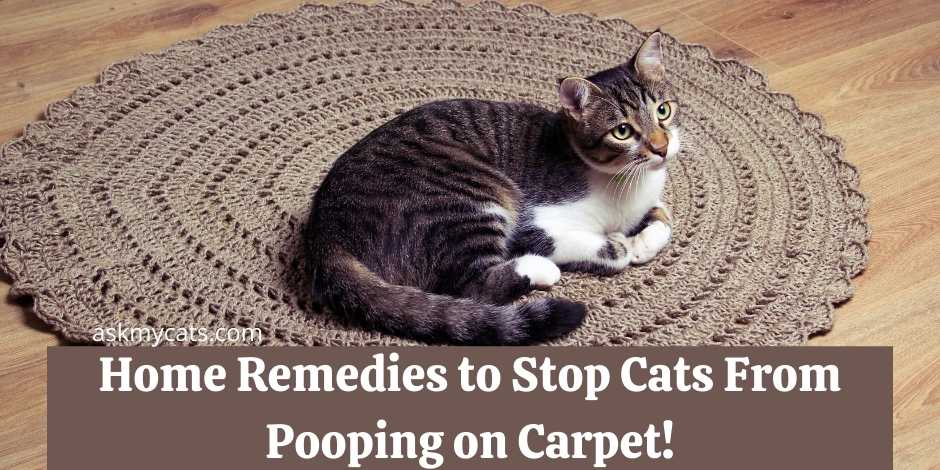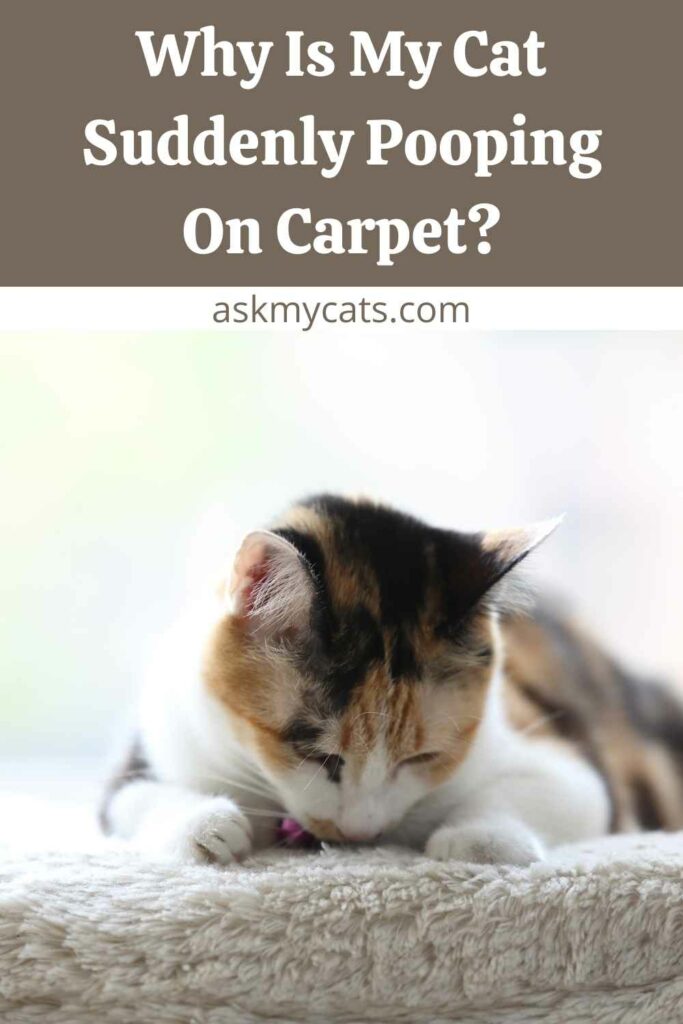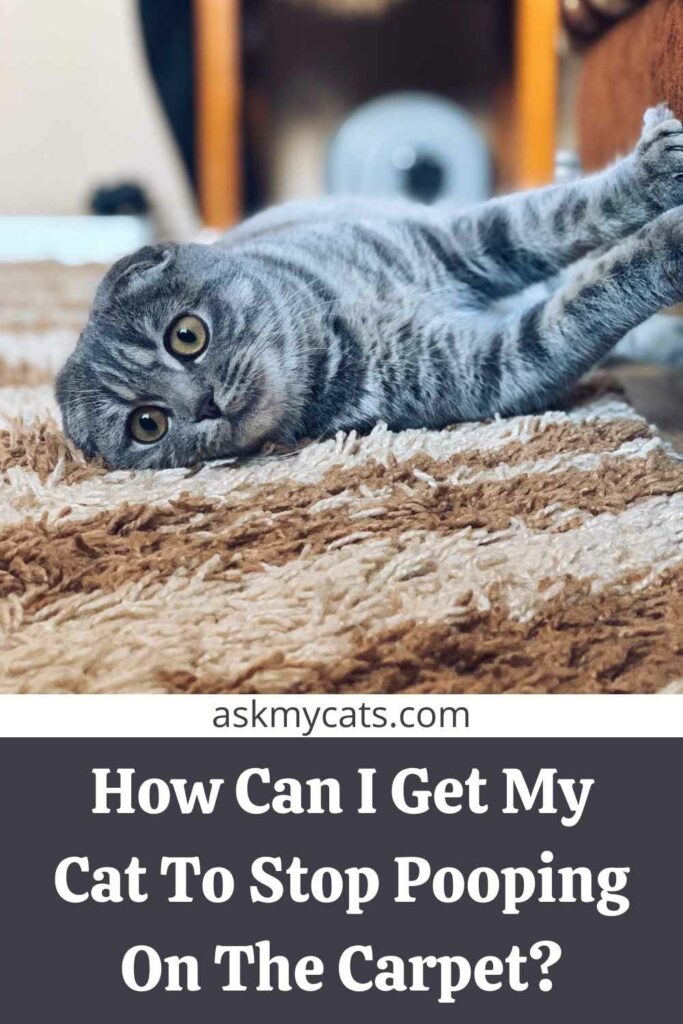It’s known as improper elimination when litter-trained cats defecate outside the box. Litter box concerns are one of the most prevalent behavioral challenges that cat owners face.
Cat owners may find it difficult to control this annoying tendency. The key to resolving the issue is determining why your cat is pooping in strange areas.
Due to its absorbency and smooth texture, the carpet is undoubtedly the most lovable place for a kitty to defecate and poop. Inappropriate elimination can also be caused by an untidy or unpleasant litter box, psychological stress, and health difficulties including urinary tract infection (UTI), diabetes mellitus, and age-related illnesses.
If you’re having trouble with your cats pooping on the carpet, try some of these easy yet effective home treatments. You may develop etiquettes and specific techniques to deter your cat from pooping on the carpet in addition to attempting these cures.


Give Your Cat the Perfect Day
Get the Free Ebook!
Why Is My Cat Suddenly Pooping On Carpet?
Your cat is suddenly pooping on the carpet because he is facing some health issues.

Carpets appear to be the most common candidates for unintentional removal of all the items in a home. The cloth has a cat-attracting quality to it.
Maybe it’s because carpets are simple to knead and paw at like litter, or maybe it’s because of the smell.
It’s also possible that absorbency is a factor. You may never know why your cat prefers the carpet, but many cat owners have reported the same problem.
Cats are notoriously secretive, so getting to the bottom of the issue will need a lot of observation. One by one, you’ll need to remove the likely reasons.
There are a few plausible causes for your cat pooping outside the litter box, no matter where it is.
It’s critical to have your cat’s health assessed before assuming the incorrect elimination is a behavioral issue.
Your doctor will question you about your cat’s behavior and whether there are any additional symptoms, such as vomiting, diarrhea, a change in appetite, or lethargy, during the checkup.
Your cat will be thoroughly examined by the veterinarian for any symptoms of illness. Additionally, lab tests and/or radiographs (X-rays) may be recommended.
Constipation, for example, might lead a cat to defecate on a rug or in another unsuitable location. Your backed-up cat, for example, may suddenly feel the need to relieve himself, but he may not be able to reach the litter box in time.
Inappropriate defecation might also be caused by pain or discomfort. Perhaps your cat has problems going in and out of the litter box and defecates when he can no longer contain it.
Perhaps the most comfortable position for the cat is one that can be achieved on the living room rug. Your veterinarian may detect a problem such as arthritis and prescribe therapy to help your cat feel better.
It’s important to keep in mind that senior cats might acquire dementia. This can have an impact on your cat’s behavior and even lead him to “forget” years of training. In this case, your veterinarian may be able to offer drugs or vitamins to help.
You might like to read about why is my cat pooping on the couch
How Can I Get My Cat To Stop Pooping On The Carpet?
Begin by carefully cleaning the places where your cat has urinated and pooped. If you don’t clean the area thoroughly enough, your cat will continue to be attracted to it.

Any goods that can be washed in the machine should be washed. If your cat has pooped on a bathmat or a cheap rug, you may just need to discard it. Use a high-quality enzymatic cleaner for pet messes for the best results.
Cats prefer large, open litter boxes because they want to keep them as clean as possible.
Switch to large litter boxes that don’t have coverings. You could even create a king-sized improvised litter box out of a huge plastic under-the-bed storage box.
Add a second litter box in a separate spot if you only have one. Place the second box near the area where your cat has been pooping in an unsanitary manner.
If you have more than one cat, you may need to purchase additional litter boxes. There should be one more litter box in the house than there are cats, according to a decent general rule of thumb. Every floor of the house should also have a litter box.
If you’re currently using scented litter, switch to unscented as soon as possible. While some people like scented litter to mask smells, many cats find artificial aromas to be overbearing and unappealing.
Also, check out why my cat keeps pooping on the floor in the same spot
Keep in mind that your cat’s nose is far more sensitive than yours. The texture of the litter may also be an issue for your cat. In the second box, try a different type of litter to see whether your cat enjoys it.
Consider the size of the litter particles as well as whether or not the litter clumps.
If your cat is young or was just acquired, he or she may need a refresher course in litter box training.
If your cat tries to poop in a handful of spots, try to make these sites as unappealing as possible. Place aluminum foil or double-sided tape on these spots until your cat no longer tries to approach them. Make the litter box the most tempting option possible.
If there’s a new cat in the house, make sure the two of them are properly introduced. If the cause of the stress is another animal or even a human, you may need to gradually desensitize your cat to it.
Make sure your cat has a secure place to go when he or she feels threatened. Also, make sure there’s adequate room between the feeding dish and the litter box so they don’t collide.
To make your cat’s environment more rewarding, learn about feline enrichment. To offer your cat extra places to go, consider adding vertical space, such as a cat tree or wall shelves.
When you’re not around, try leaving interactive toys around. As much as possible; play with your cat. A bored and irritated cat is more prone to act out.
Don’t get too worked up over it since it won’t happen overnight. Simply clean the dirty areas, keep the litter box clean and appealing, and provide your cat with a happy and entertaining environment.
Don’t quit if things aren’t getting better and you’ve reached your limit. Request a referral to a veterinary behaviorist or an applied animal behaviorist from your veterinarian. Having an expert opinion will be well worth the money.
Also, check out why is my elderly cat suddenly pooping on the floor
What Smells Deter Cats From Pooping?
Since cats are extremely sensitive to smell, strong aromas like lavender, peppermint, or cinnamon work well to keep them at distance. Pick one of these smells, mix it with some water, and sprinkle it all over the carpet.
While this is only a temporary solution, it is inexpensive and non-toxic. Another natural and simple way to keep cats out of your garden is to finely cut citrus fruits (such as lemons, limes, and oranges) and scatter them about.
Cats dislike the strong citrus aroma, much like they dislike lavender and peppermint.
Another great way to keep your cat from defecating on the carpet is to use onion juice. Because of the onion’s pungent, disagreeable odor, this treatment is effective.
To make the extract, chop 2-3 peeled onions in half and place them in the juicer. After that, pour the juice into a spray bottle and fill it with 1/4 cup of water before spraying it over the carpet.
Check out more details about Does Black Pepper Keep Cats Away?
Does Vinegar Stop Cats From Pooping On The Carpet?
Vinegar acts as an excellent repellent for cats and stops them from pooping on the carpet.
When it comes to preventing cats from pooping on the carpet, no home treatment beats vinegar. Vinegar works because it has a strong, unique smell that cats despise.
In a spray bottle, mix equal parts white vinegar and water to make a deterrent spray. Shake it thoroughly before sprinkling it freely on the carpet.
Check out more details about Does Vinegar Keep Cats Away?
Frequently Asked Questions
What to put down to stop cats pooping?
Rue, lavender, and pennyroyal, as well as Coleus Canina and lemon thyme, are unpleasant to cats. Plant a handful of them in your backyard. Pollinators and other beneficial insects may be attracted to interplanting. Cats despise citrus, so any fruit peelings from oranges and other citrus fruits can help keep them away.
What is the best homemade cat repellent?
Many individuals have had success using citronella oil as a homemade cat deterrent. Citronella is primarily recognized as a mosquito repellent; however, cats dislike the smell of Citronella. Simply combine one part of Citronella oil and four parts of water in a spray bottle and saturate the troublesome regions.
Does chili powder deter cats?
Cat repellents aren’t meant to last more than a day or two before deteriorating and losing their effectiveness. Pepper – black pepper and chili pepper may be used to produce a basic animal repellent. To keep cats away from annuals and perennials, sprinkle the powder on them. Citrus is a scent that cats dislike.
Final Words
Cat parenthood is difficult, especially when your litter-trained feline pal refuses to use the litter box and instead defecates on your pricey carpet. This annoyance is referred to as ‘inappropriate elimination.’ In this instance, speaking with a knowledgeable veterinarian is strongly suggested.
Leave your questions in the comments section below.
Also, check out: Does Irish Spring Soap Keep Cats Away?
Must Read: 5 Natural & Safe DIY Home Remedies to Keep Cats Away

How can we stop an older male cat and three female six month kittens from using the carpet that’s close to the litter boxes that they don’t want to use.
Thank you for taking time to answering my question.
Hello Thomas,
The most common thing I would suggest you to change is the position of a litter box.
Also, check if they are comfortable with the existing litter box or not. You can try changing litter box also.
Happy Cat Parenting
Trying to stop an 8 year old female cat from pooping on the carpet all over the house. She has been checked by our vet and there are no physical problems. I have aluminum foil all over the house, changed to a scent-less litter and tried different litter boxes. Nothing seems to work. We are, frankly, at our wits end trying to eliminate this problem. Any other suggestions?
Hello Cheryl,
I can totally understand your frustration. It’s really annoying when the cat keeps pooping on the carpet.
Any Suggestion?
Patience is the KEY
Try out various methods already suggested in the article and give your cat time to be trained.
Happy cat parenting
anyone got any ideas, my outside cat has recently started pooping inside the house, she has never done this before.
she will go outside then come in to poop, i have cleaned it up and hopefully got rid of scent, as she has done it in multiple places. its now most days, help
Your cat is likely feeling anxious or stressed. He only urinates inside the house because he feels safe doing so. Keep a few litter boxes around your home to encourage people to use them instead of carpets for bathroom breaks.